- Home
- Norman Mailer
The Fight
The Fight Read online
Praise for Norman Mailer
“[Norman Mailer] loomed over American letters longer and larger than any writer of his generation.”
—The New York Times
“A writer of the greatest and most reckless talent.”
—The New Yorker
“Mailer is indispensable, an American treasure.”
—The Washington Post
“A devastatingly alive and original creative mind.”
—Life
“Mailer is fierce, courageous, and reckless and nearly everything he writes has sections of headlong brilliance.”
—The New York Review of Books
“The largest mind and imagination at work [in modern] American literature … Unlike just about every American writer since Henry James, Mailer has managed to grow and become richer in wisdom with each new book.”
—Chicago Tribune
“Mailer is a master of his craft. His language carries you through the story like a leaf on a stream.”
—The Cincinnati Post
2013 Random House eBook Edition
Copyright © 1975 by Norman Mailer
All rights reserved.
Published in the United States by Random House Trade Paperbacks, an imprint of The Random House Publishing Group, a division of Random House LLC, a Penguin Random House Company, New York.
RANDOM HOUSE and the HOUSE colophon are registered trademarks of Random House LLC.
Originally published in hardcover in the United States by Little, Brown and Company, Boston, in 1975.
Portions of this book originally appeared in Playboy magazine.
Grateful acknowledgment is made to Grove/Atlantic, Inc., and Faber and Faber Ltd. for permission to reprint an excerpt from The Palmwine Drunkard by Amos Tutuola (published by Faber and Faber Ltd. as The Palm Wine Drinkard), copyright © 1953 by George Braziller, copyright © the Estate of Amos Tutuola. Reprinted by permission of Grove/Atlantic, Inc., and Faber and Faber Ltd.
Library of Congress Cataloging-in-Publication Data
Mailer, Norman
The fight / Norman Mailer.
p. cm.
Originally published: Boston: Little, Brown, [1975]
eISBN: 978-0-8129-8596-2
www.atrandom.com
v3.1
CONTENTS
Cover
Title Page
Copyright
Part I The Dead Are Dying of Thirst 1. Carnal Indifference
2. The Bummer
3. The Millionaire
4. A Gang of Champs
5. Dead Man on the Floor
6. Our Black Kissinger
7. Long Voyage
8. Elmo in Zaïre
9. King of the Flunkies
Part II N’golo 10. Sorcerers
11. A Bus Ride
12. The Dressing Room
13. Right-Hand Leads
14. The Man in the Rigging
15. The Executioner’s Song
16. The Rains Came
17. A New Arena
18. Bagarre à Dakar
19. Lucky, the Three-Time Loser
About the Author
Other Books by This Author
THE DEAD ARE
DYING OF THIRST
1. CARNAL INDIFFERENCE
THERE IS ALWAYS a shock in seeing him again. Not live as in television but standing before you, looking his best. Then the World’s Greatest Athlete is in danger of being our most beautiful man, and the vocabulary of Camp is doomed to appear. Women draw an audible breath. Men look down. They are reminded again of their lack of worth. If Ali never opened his mouth to quiver the jellies of public opinion, he would still inspire love and hate. For he is the Prince of Heaven — so says the silence around his body when he is luminous.
When he is depressed, however, his pale skin turns the color of coffee with milky water, no cream. There is the sickly green of a depressed morning in the muddy washes of the flesh. He looks not quite well. That may be a fair description of how he appeared at his training camp in Deer Lake, Pennsylvania, on a September afternoon seven weeks before his fight in Kinshasa with George Foreman.
His sparring was spiritless. Worse. He kept getting hit with stupid punches, shots he would normally avoid, and that was not like Ali! There was an art to watching him train and you acquired it over the years. Other champions picked sparring partners who could imitate the style of their next opponent and, when they could afford it, added a fighter who was congenial: someone they could hit at will, someone fun to box. Ali did this also, but reversed the order. For the second fight with Sonny Liston, his favorite had been Jimmy Ellis, an intricate artist who had nothing in common with Sonny. As boxers, Ellis and Liston had such different moves one could not pass a bowl of soup to the other without spilling it. Of course, Ali had other sparring partners for that fight. Shotgun Sheldon comes to mind. Ali would lie on the ropes while Sheldon hit him a hundred punches to the belly — that was Ali conditioning stomach and ribs to take Liston’s pounding. In that direction lay his duty, but his pleasure was by way of sparring with Ellis as if Ali had no need to study Sonny’s style when he could elaborate the wit and dazzle of his own.
Fighters generally use a training period to build confidence in their reflexes, even as an average skier, after a week of work on his parallel, can begin to think he will yet look like an expert. In later years, however, Ali would concentrate less on building his own speed and more on how to take punches. Now, part of his art was to reduce the force of each blow he received to the head and then fraction it further. Every fighter does that, indeed a young boxer will not last long if his neck fails to swivel at the instant he is hit, but it was as if Ali were teaching his nervous system to transmit shock faster than other men could.
Maybe all illness results from a failure of communication between mind and body. It is certainly true of such quick disease as a knockout. The mind can no longer send a word to the limbs. The extreme of this theory, laid down by Cus D’Amato when managing Floyd Patterson and José Torres, is that a pugilist with an authentic desire to win cannot be knocked out if he sees the punch coming, for then he suffers no dramatic lack of communication. The blow may hurt but cannot wipe him out. In contrast, a five-punch combination in which every shot lands is certain to stampede any opponent into unconsciousness. No matter how light the blows, a jackpot has been struck. The sudden overloading of the victim’s message center is bound to produce that inrush of confusion known as coma.
Now it was as if Ali carried the idea to some advanced place where he could assimilate punches faster than other fighters, could literally transmit the shock through more parts of his body, or direct it to the best path, as if ideally he were working toward the ability to receive that five-punch combination (or six or seven!) yet be so ready to ship the impact out to each arm, each organ and each leg, that the punishment might be digested, and the mind remain clear. It was a study to watch Ali take punches. He would lie on the ropes and paw at his sparring partner like a mother cat goading her kitten to belt away. Then Ali would flip up his glove and let the other’s punch bounce from that glove off his head, repeating the move from other angles, as if the second half of the art of getting hit was to learn the trajectories with which punches glanced off your gloves and still hit you; Ali was always studying how to deaden such shots or punish the glove that threw the punch, forever elaborating his inner comprehension of how to trap, damp, modify, mock, curve, cock, warp, distort, deflect, tip, and turn the bombs that came toward him, and do this with a minimum of movement, back against the ropes, languid hands up. He invariably trained by a scenario that cast him as a fighter in deep fatigue, too tired to raise his arms in the twelfth round of a fifteen-round fight. Such training may have saved him from being knocked out by Frazier in
their first fight, such training had been explored by him in every fight since. His corner would scream “Stop playing!,” the judges would score against him for lying on the ropes, the fight writers would report that he did not look like the old Ali and all the while he was refining methods.
This afternoon, however, in Deer Lake it looked as if he were learning very little. He was getting hit by stupid punches and they seemed to take him by surprise. He was not languid but sluggish. He looked bored. He showed, as he worked, all the sullen ardor of a husband obliging himself to make love to his wife in the thick of carnal indifference.
The first sparring partner, Larry Holmes, a young light-colored Black with a pro record of nine wins and no losses, boxed aggressively for three rounds, hitting Ali more often than he got hit in return, which in itself might not have been unusual — sometimes Ali would not throw a punch through all of a round — but on this afternoon it seemed as if Ali did not know how to use Holmes. Ali had the disgusted expression Sugar Ray Robinson used to get toward the end of his career when struck on the nose, a grimace of disdain for the occupation as if you could lose your looks if you weren’t careful. The afternoon was hot, the gym was even hotter. It was filled with tourists, more than a hundred, who had paid a dollar to get in — there was a late-summer apathy to the proceedings. Once in a while, Ali would set out to chastise Holmes for his impudence, but Holmes was not there to be instructed for nothing. He fought back with all the eagerness of a young pro who sees a maximum of future for himself. Ali could of course have given a lesson, but he was boxing in the depths of a bad mood. Part of Ali’s strength in the ring was fidelity to his mood. If, when speaking to the press, a harsh and hysterical tone entered his voice as easily as other men light a cigarette, he was never frantic in the ring, at least not since the fight with Liston in Miami in 1964 when he won the Heavyweight Championship. No, just as Marlon Brando seemed to inhabit a role as though it were a natural extension of his mood, so Ali treated boxing. In a bad mood, he would stay in his lethargy, box out of his very distaste for the staleness of this occupation. Often he trained all of an afternoon in such a bad spirit. The difference today was that he was running into unexpected punches — the end of the world for Ali. In annoyance, he would punish Holmes by wrapping an arm around his head. Over the years, Ali had become one of the best wrestlers in the ring. But then if karate kicks had been introduced to boxing, Ali would also have been first at that. His credo had to be that nothing in boxing was foreign to him. Now, however, such virtuosity was reduced to wrestling with Holmes. When they separated, Holmes would go back to the attack. Toward the end of three rounds, Ali started stinging him with punches. Holmes stung him back.
Ali’s next sparring partner, Eddie “Bossman” Jones, a Light-Heavyweight, was a dark sawed-off version of George Foreman. He didn’t look five-ten in height, and Ali used him as a playmate. Absolutely comfortable with Jones (a fighter reminiscent of other fighters who stood flat-footed and belted away) Ali lay on the ropes and took Bossman’s punches when he chose to and blocked them when he wished. For all it seemed to demand, Ali could have been an inspector on an assembly line, accepting and rejecting the product. “This piece passes, this one won’t.” To the degree that boxing is carnality, meat against meat, Ali was master when it was time to receive, he got the juice out of it, the aesthetic juice of the punches he blocked or slipped, plus all the libidinal juice of Bossman Jones banging away on his gut. For all of a round Bossman belabored Ali, and Ali communed with himself. In the second of their two rounds, Ali stepped off the ropes for the last two minutes and proceeded for the first time in the afternoon to throw punches. His master’s assortment leaped forth, jabs with a closed glove, jabs with an open fist, jabs with a twist of the glove to the right, jabs with a turn to the left, then a series of right-hand leads offered like jabs, then uppercuts and easy hooks from a stand-up position, full of speed off both hands. With each punch, his glove did something different, as if the fist and wrist within the glove were also speaking.
Now, Ali’s trainer, Bundini, came alive with cries from the corner. “All night long!” he shouted happily. But Ali did not throw anything hard, rather he hit Bossman Jones with a pepperpot, ting, ting, bing, bap, bing, ting, bap! and Bossman’s head bapped back and forth like a speed bag. “All night long!” There was something obscene in watching, as if the man’s head were on a potter’s wheel and into a speed bag precisely was it being shaped. Although he had not been hit with any force, Jones (one score for the theorem of D’Amato) was wobbly when the round ended. And happy. He had been good for the boss. He had the kind of face to propose that thousands of punches had bounced off his persona, that celestial glow of a hard worker whose intelligence has been pounded out long ago.
The last three rounds were with Roy Williams, introduced to the crowd as Heavyweight Champion of Pennsylvania, and he was Ali’s size, a dark gentle sleepy-looking man who boxed with such respect for his employer that the major passion appeared to be a terror of messing Ali’s charisma. Williams pawed the air and Ali wrestled him around. He seemed to be working now more on wrestling than boxing, as if curious to test his arms against Roy Williams’s strength. Three slow rounds went by with the head of the Heavyweight Champion of Pennsylvania in the crook of Ali’s bicep. It looked like the terminal stage of a street fight when not much more than heavy breathing will go on.
Ali had now been boxing eight rounds, five of them easy, too easy to show this much fatigue — the green of his skin did not speak of a good liver. The tourists, a crowd in the main of white mill workers in flowered sport shirts, sprinkled with an occasional beard or biker, looked apathetic. You had to be familiar with Ali’s methods to have even a remote idea of what this workout could signify. Toward the middle of the last round Bundini began to be heard again. Hardly unknown to readers of sports columns (for he was the inventor of “Float like a butterfly, sting like a bee”) he had on average days a personality more intense per cubic inch than Ali’s, and was now screaming in a voice every onlooker would remember, for it was not only hoarse and imprecatory but suggestive of the ability to cut through every insulation in the atmosphere. Bundini was summoning djinns. “Snake-whip him! Stick him! Stick mean!” he howled with his head back, his bald rocketing eyes spearing ectoplasmic ogres. Ali did not respond. He and Roy Williams kept clinching, wrestling, and occasionally thumping one another. No art. Just the heavy exertions of overtired fighters so much like the lurching of overtired furniture movers. “Get off,” cried Bundini, “get off on him.” Seconds were ticking down. Bundini wanted a flurry, wanted it for morale, for Ali’s good conscience tonight, for the confirming of good habit, for the end if nothing else of this wretched bad mood. “Get off on him! Stick him! Come on, baby. Let’s close the show on him, let’s close this show! Get off. Close him! Close him! Close him!” went Bundini into the final hollering seconds of the eighth and final round and Ali and Williams, working slowly, came to the end of their day. No dervish. No flurry. The bell. It was not a happy workout. Ali looked sour and congested.
He did not look a great deal happier one hour later when available for interview. He sprawled on a couch in his dressing room, the exertion of the workout still on him, so that he looked heavy for once and not intelligent; indeed, not even handsome. His face was a hint swollen. It offered the suggestion his head would thicken, and he would look more like a pug in years to come. Most startling was his lack of energy. Usually Ali liked to talk after a workout, as though the physical effort only teased his energies enough to confirm his passion, which was to speak. Today, however, he lay back on the couch, let others talk to him. There were a number of Black men in the room, and they approached as courtiers, each taking his turn to whisper in Muhammad’s ear, then falling back to sit in audience. An interviewer from a Black network held a microphone ready in case Ali wished to respond, but this was one occasion when he did not.
The workout seemed to have taken too much. An absence of stimulation heavy as gloom w
as in the air. Of course, it is not uncommon for fighters’ camps to be gloomy. In heavy training fighters live in dimensions of boredom others do not begin to contemplate. Fighters are supposed to. The boredom creates an impatience with one’s life, and a violence to improve it. Boredom creates a detestation for losing. So the furniture is invariably every shade of dull gray and dull brown, the sparring partners beaten half into insensibility are quiet when not morose, and the silence seems designed to prepare the fighter for his torture on the night of the fight. Ali’s camps, however, usually offered vivacity, his own if no one else’s. It was as if Ali insisted on having fun while he trained. Not today. It was like any fighter’s camp. Unspoken sentiments of defeat passed through the drably furnished room.
Just as a man serving a long sentence in prison will begin to live in despair about the time he recognizes that the effort to keep his sanity is going to leave him less of a man, so a fighter goes through something like the same calculation. The prisoner or the fighter must give up some part of what is best in him (since what is best for any human is no more designed for prison — or training — than an animal for the zoo). Sooner or later the fighter recognizes that something in his psyche is paying too much for the training. Boredom is not only deadening his personality but killing his soul. No surprise then if Ali had been in revolt against training for half a career.
“What do you think of the odds?” someone asked, and the question, thrown up without preparation, left Ali looking out-of-phase. “I don’t know about betting,” he said. It was explained that man-to-man the odds were 2½ to 1 against him. “That’s a lot?” he asked, and said almost in surprise, “They really think Foreman’ll win!” He looked less depressed for the first time this day. “You fellows are in position to make a lot of money with odds like that.” Thought of the fight, however, seemed to cheer him a faint degree as if he were a convict thinking of the hour when his time is up. (Of course a killer might be waiting on the street.) “Would you like,” he asked on the spur of this small cheer, “to hear my new poem?”

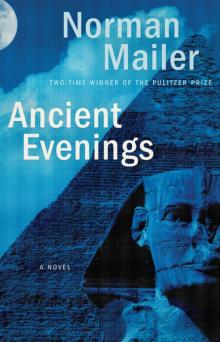 Ancient Evenings
Ancient Evenings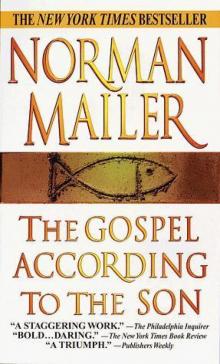 The Gospel According to the Son
The Gospel According to the Son Oswald's Tale: An American Mystery
Oswald's Tale: An American Mystery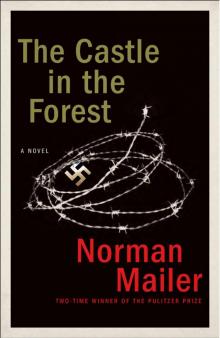 The Castle in the Forest
The Castle in the Forest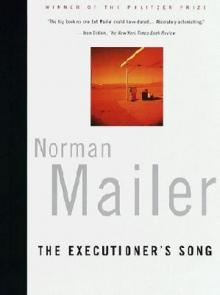 The Executioner's Song
The Executioner's Song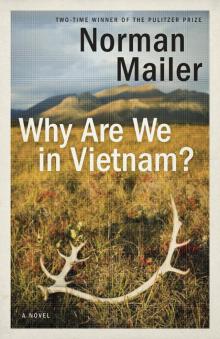 Why Are We in Vietnam?
Why Are We in Vietnam?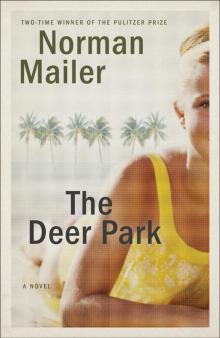 The Deer Park: A Play
The Deer Park: A Play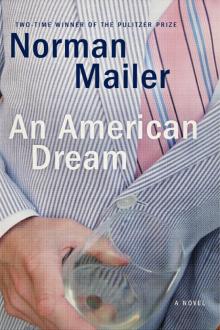 An American Dream
An American Dream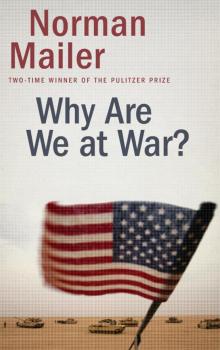 Why Are We at War?
Why Are We at War?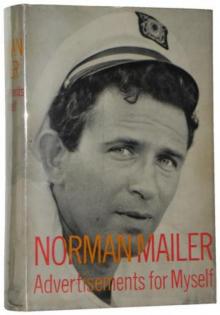 The Time of Her Time
The Time of Her Time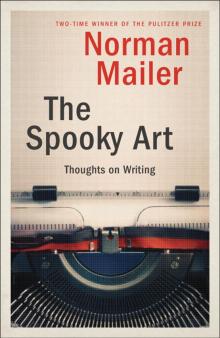 The Spooky Art: Thoughts on Writing
The Spooky Art: Thoughts on Writing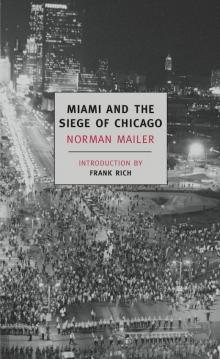 Miami and the Siege of Chicago
Miami and the Siege of Chicago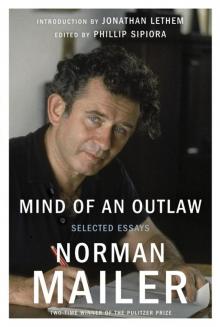 Mind of an Outlaw: Selected Essays
Mind of an Outlaw: Selected Essays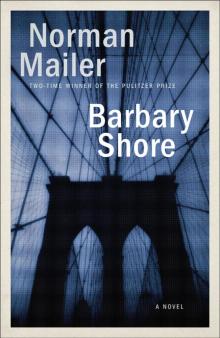 Barbary Shore
Barbary Shore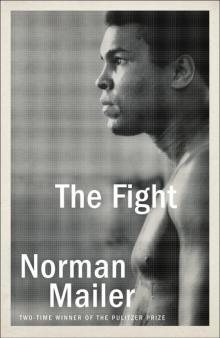 The Fight
The Fight Harlot's Ghost
Harlot's Ghost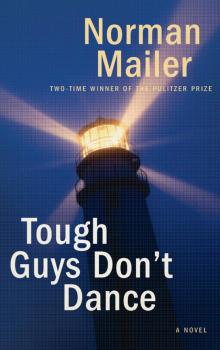 Tough Guys Don't Dance
Tough Guys Don't Dance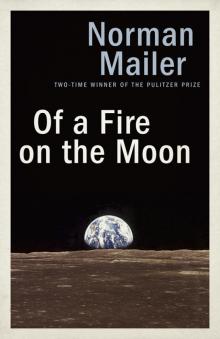 Of a Fire on the Moon
Of a Fire on the Moon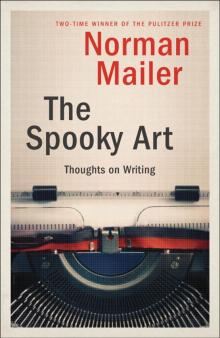 The Spooky Art
The Spooky Art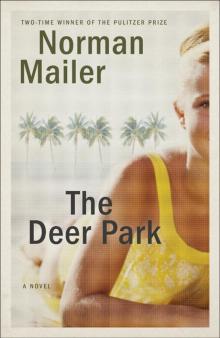 The Deer Park
The Deer Park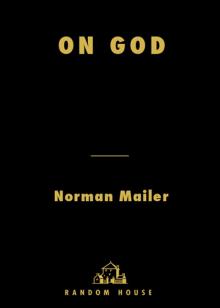 On God: An Uncommon Conversation
On God: An Uncommon Conversation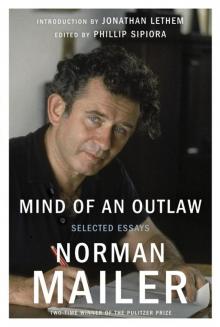 Mind of an Outlaw
Mind of an Outlaw Oswald's Tale
Oswald's Tale